Last updated on March 2nd, 2025
A boiler leaking water can cause your boiler to not fire up, rust, or become dangerous.
I have been fitting and fixing boilers full-time for over a decade and have repaired many leaking boilers. In this post, I’ll share some of what I have learned over the years from my on-the-job experiences.
Leaking water from underneath
There are many places a boiler can leak water from, but it’s almost always leaking from underneath. This doesn’t mean the leak is at the bottom of the boiler though. The leak could be at the top of the boiler inside but collects in the bottom of the boiler before dripping out underneath.
The best way to find out where leaks are coming from is to keep checking as high as possible to look for signs of water because where it’s dripping from is not usually where it’s leaking from.
Common boiler leaks
Certain boilers have certain recurring problems which typically get fixed by the boiler manufacturer when they make a new boiler or update a faulty part.
Here are some common recurring boiler leaks I come across:
Worcester boiler leaks
A Worcester boiler leaking water is usually from one of three parts which will need to be replaced to stop the leaking:
- Flow turbine adapter on the right-hand side
- Flow unit left-hand block
- Right hand block return unit
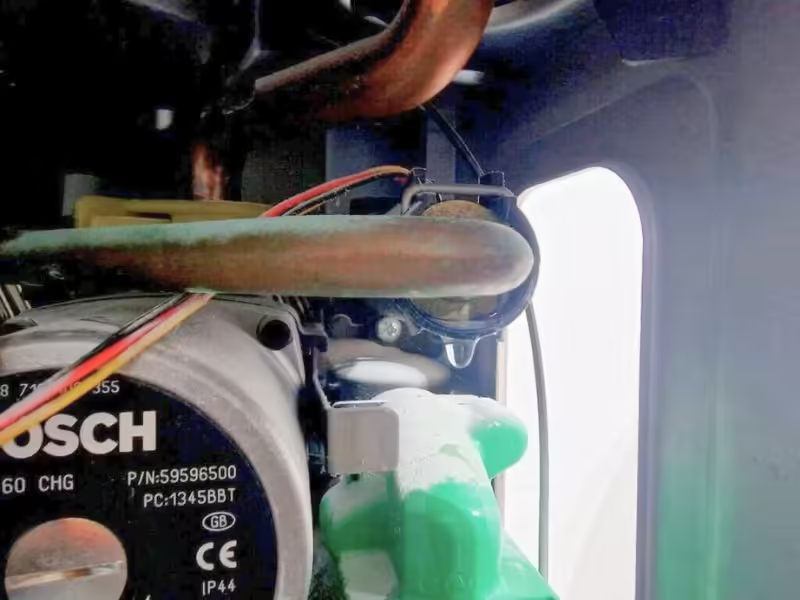
Baxi boiler leak
A Baxi boiler leaking water on the left-hand side is a very common leak repair. On older Baxi boilers it’s very common for the diverter valve to leak. It can usually be repaired by stripping the diverter valve and replacing the rubber diaphragm inside and the small nut on the outside.
Boiler pipe leaking
When you have a boiler pipe leaking water you will need to do one of these things:
- Tighten the nut if it’s on a compression fitting
- Resolder the fitting
- Replace the section of pipe
- Solder a patch fitting on
Leaking from overflow pipe
A boiler leaking water outside means the pressure relief valve is leaking out of the blow-off or overflow pipe. The pressure relief valve leaking is usually a sign of other problems causing it to leak but it often means you will need to replace the pressure relief valve. You should make sure you find and fix any other problems before replacing it or it will just leak again.
Condensate pipe leaking
A boiler condensate pipe leaking out of the end outside is normal but if it’s leaking from a fitting inside the house then this could potentially be dangerous.
A frozen condensate pipe can cause it to leak sometimes but condensate water is acidic and eats away at copper and brass which is why they have to be plastic. If you have a boiler condensate pipe leaking onto a copper pipe, especially gas, then this should be fixed as soon as possible.
Filling loop leaking
A boiler filling loop leaking usually means it needs to be replaced. You can tighten the nuts up if it’s leaking from them but you will probably need to replace the boiler filling loop or filling loop valve.
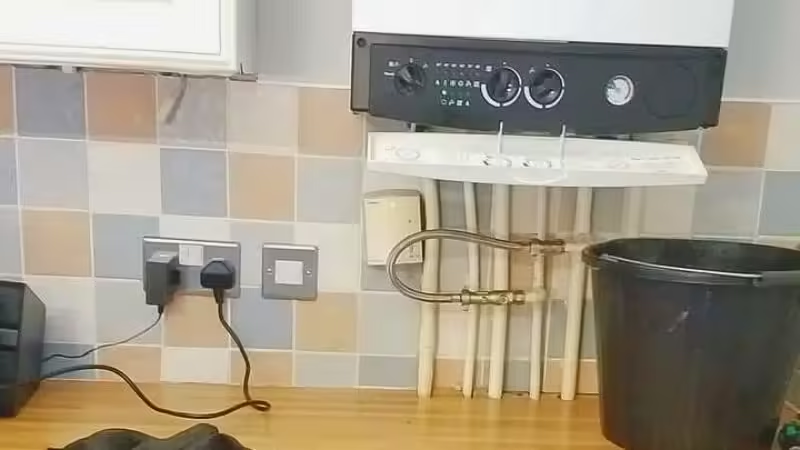
Flue leaking water
A boiler flue leaking water is typically a sign it’s not fitted correctly. A condensing boiler creates condensate wastewater which is created from the flue gases.
This wastewater needs to run back into the boiler condensate trap via the flue which is why the flue needs to be pointing slightly up and away from the boiler. If the flue is pointing slightly down (or even straight), the condensate will drip out of the end of the boiler.
If the boiler flue is leaking from anywhere else, eg a flue connection, this will need to be looked at and fixed by a gas engineer as soon as possible.
Summary
An old boiler leaking water may be a sign the boiler is on its way out and needs to be replaced soon. Leaking brown water typically means you have a dirty heating system which is causing problems and a good sign you need to flush the heating system after fixing the leak.
If you have a leak from any type of compression connection, eg a valve on the flow or return pipe, or a boiler drain valve, you should try tightening the nuts with an adjustable spanner.
Feel free to ask any questions in the comments below, and I’ll do my best to help. If you found this post helpful, please consider sharing it.


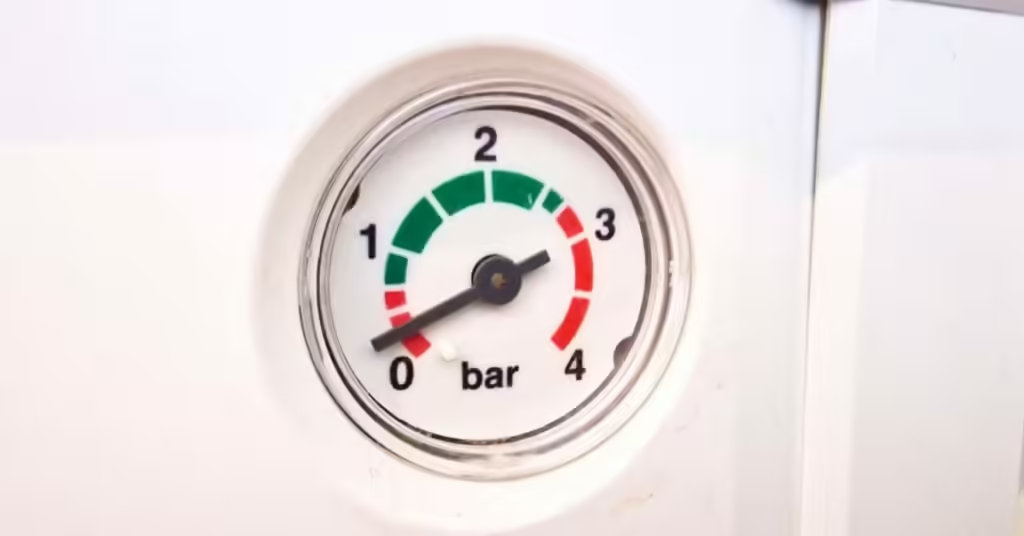
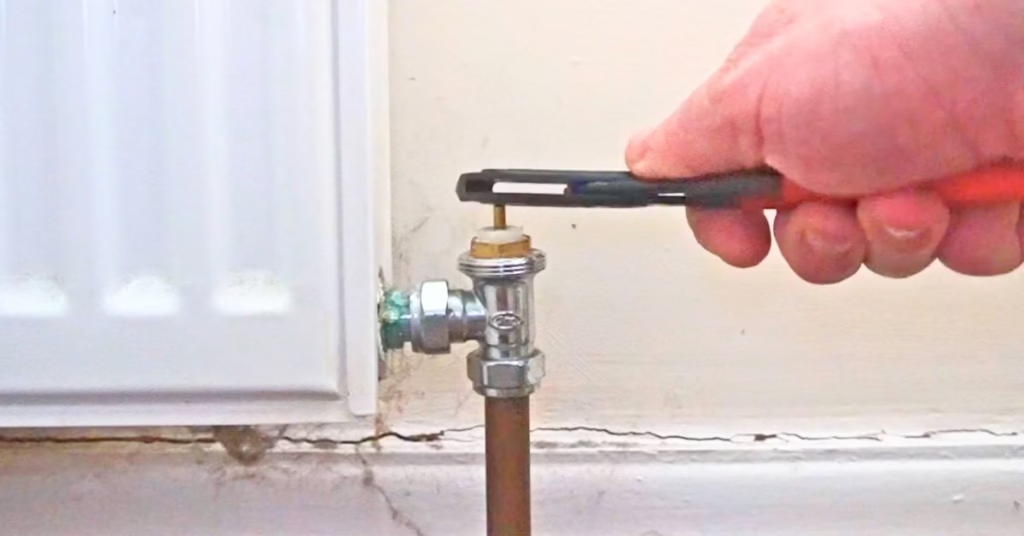
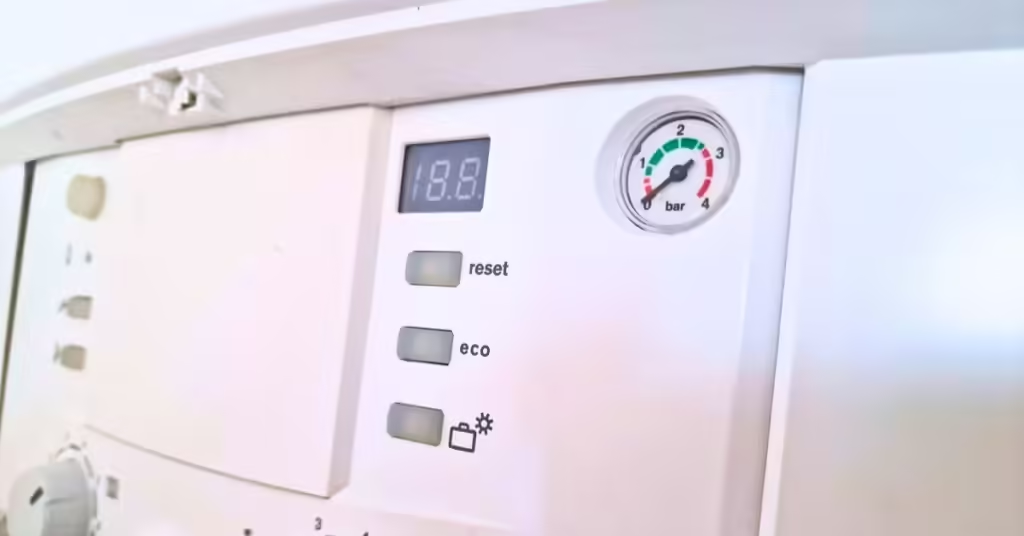
Hi I have a logic combo boiler the last pipe on the right as you look at it which in this case goes into outhouse but leads to nothing it leaks where it comes in to outhouse ?
that’s the pipe from the pressure relief valve, which means there is either a problem with the expansion vessel inside the boiler, or the pressure relief valve is faulty.
My boiler Ariston has had 4 o rings replaced and is now leaking a drip every 10 seconds it appears to be coming from the bottom left hand side, I took the cover off to see where it’s coming from
Roy 3rd May 23
Hi Steve,
My boiler looses pressure every couple of day and shows E1 , so I fill it up to 2 bar, then when it fires up after a while it reads 3.5 bar ,
Any ideas what the problem, do I need to release the pressure or just leave it
Cheers Tom
Hi Tom,
Sounds like you have an expansion vessel problem, it will probably need to be recharged or replaced. Might need a new pressure relief valve also. You should fill the pressure to 1.5 bar, not 2 bar.
Hi there, I’ve got a Worcester combi (i think) hot water for sinks not shower, and heating, it started dripping below this eve, it seems when I returned home and started using hot water, tried heating and seemed to not leak,?…Anyideas I’ve got landlord to contact a plumber, I’ve turned boiler off! Is that right thing to go? It seems to have stopped dripping not using hot water it heating, Thank you any advice most welcome
Hi Marcus,
Sounds like you’ve got a leak on the hot water side of the combi boiler so using the heating will be fine. Just try not to use the hot water until the leak it’s fixed.